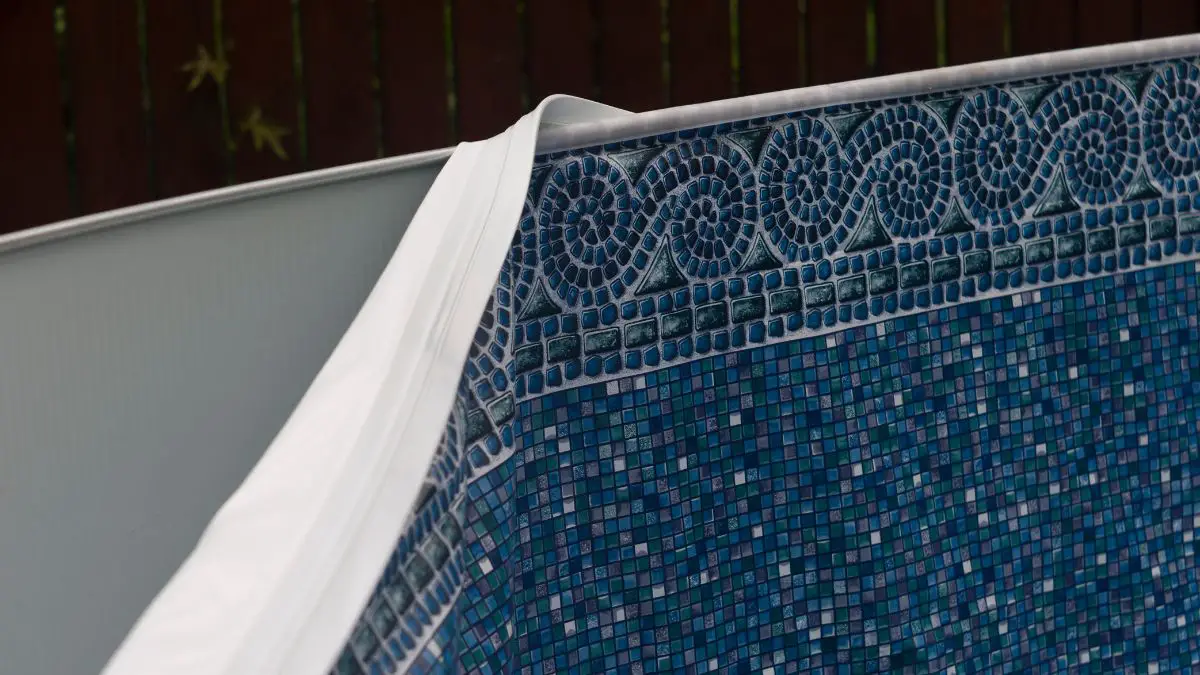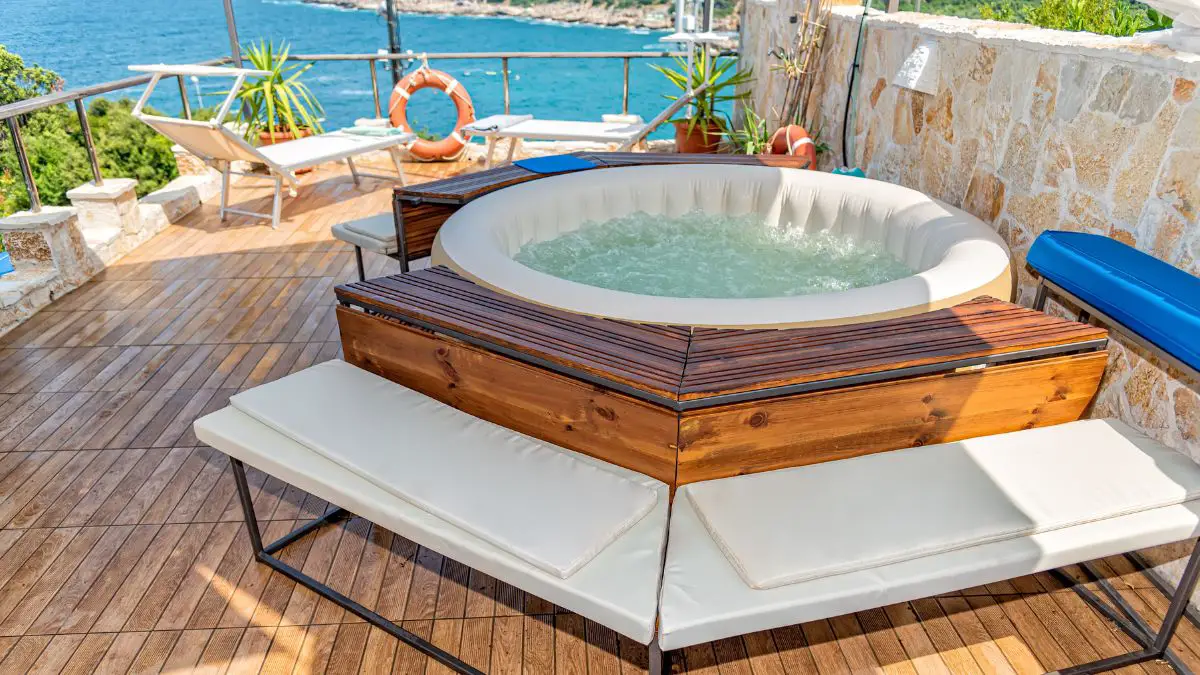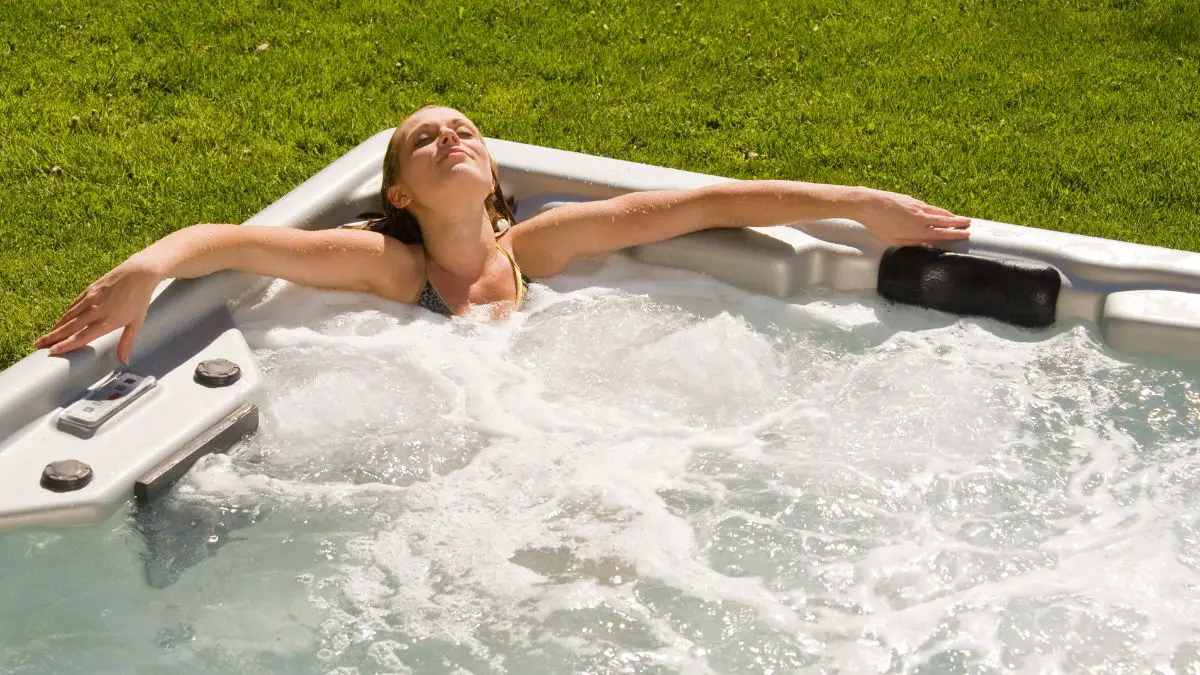Saltwater pools offer several benefits over traditional chlorine pools, making them an increasingly popular choice for residential and commercial use.
Here are the key benefits of a saltwater pool:
- Gentle on Eyes and Skin: Saltwater pools have a lower salt concentration than seawater, closely mimicking the salt found in human tears. This makes the water less likely to irritate your eyes than chlorinated water. Additionally, saltwater is known to be softer on the skin and can even have therapeutic effects for skin conditions such as eczema, psoriasis, and acne.
- Improved Respiratory Health: Saltwater pools can benefit people with respiratory issues. Inhaling fine salt particles can thin mucus in the lungs, promote healthy breathing, and reduce allergies, which is less likely with chlorine, which can sometimes irritate the respiratory system.
- Relaxation and Stress Relief: Swimming in saltwater enhances the body’s natural relaxation processes, which can help alleviate stress and anxiety. The presence of bromine in salt water can also help in treating muscle and joint aches, pains, and soreness.
- Lower Maintenance Costs: Saltwater pools can be less expensive to maintain in the long run. They require less frequent chemical adjustments, and the saltwater generator produces chlorine as needed, which can lead to lower chemical costs.
- Environmental Benefits: Saltwater pools are considered better for the environment as they reduce the need to store and handle chlorine, a toxic chemical.
- No Harsh Chlorine Smell: Saltwater pools produce fewer chloramines, which is responsible for the strong chlorine smell often associated with traditional pools. This results in a more pleasant swimming environment.
- Soothing for Muscles and Joints: The salt in saltwater pools can help soothe sore muscles and joints, similar to the effect of Epsom salts used in baths. This can be particularly beneficial for individuals with chronic health problems like arthritis.
- Safer Storage: Storing salt is generally safer than storing chlorine, a hazardous chemical. This can be a significant advantage for pool owners concerned about safety.
- Preservation of Swimwear: Saltwater is less likely to strip colors from swimwear, meaning that clothing can last longer than exposure to traditional chlorine pools.

Understanding Saltwater Pools
You might wonder, “What exactly is a saltwater pool, and how does it work?” Well, let’s demystify this for you.
A saltwater pool operates on the principle of electrolysis. Salt, or sodium chloride, is added to the pool water. Now containing approximately 3,000 parts per million of salt, the water is passed through a salt cell, which is an integral part of the pool’s filtration system. This cell is where the magic happens.
The salt cell contains metal plates charged with an electrical current. As the saltwater passes through these electrified plates, the electrolysis process occurs. The salt (sodium chloride) is broken down into its basic components: sodium and chloride.
The chloride is instantly transformed into chlorine gas, which dissolves in the water, creating a mild, natural chlorine solution.
This chlorine solution is what sanitizes your pool, killing bacteria and algae. The beauty of this system is that once the chlorine has done its job, it converts back into salt, ready to be reused. This cycle continues, making saltwater pools a self-chlorinating system.
Now, let’s compare this to traditional chlorine pools. You manually add chlorine as liquid, powder, chlorine tablets, or sticks in a chlorine pool. This chlorine is used up as it sanitizes the pool, and you have to continually add more to maintain a safe and clean swimming environment.
In contrast, a saltwater pool is constantly generating its chlorine. This means:
- You’re not handling or storing hazardous chlorine chemicals.
- The chlorine levels in the pool are more stable, reducing the likelihood of over-chlorination or under-chlorination.
- The water in a saltwater pool feels softer and is less irritating to the skin and doesn’t cause eye irritation.
So, in essence, a saltwater pool provides a more comfortable, low-maintenance, and safer swimming experience than a traditional chlorine pool.
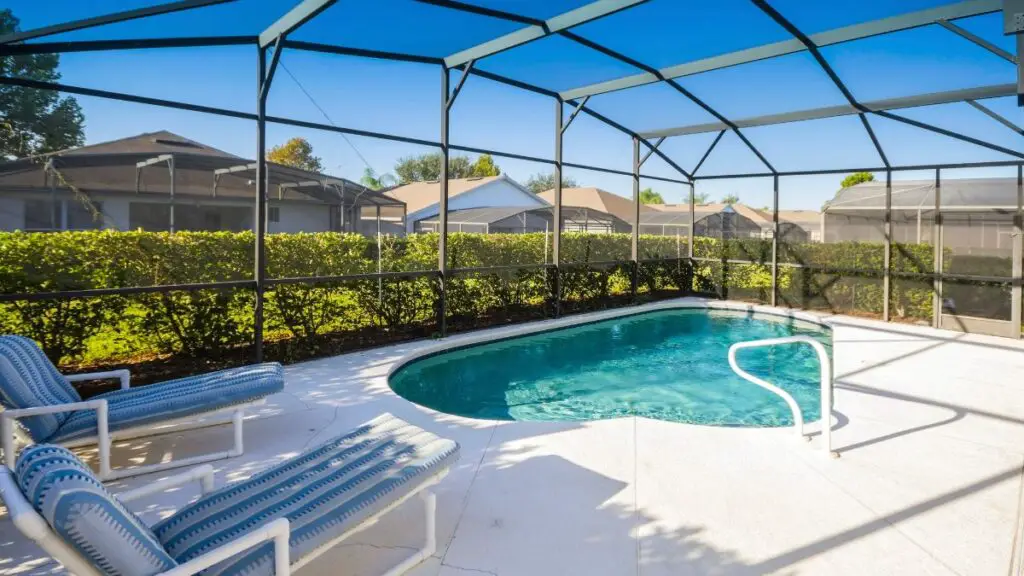
The Remarkable Benefits of Saltwater Pools
Health Benefits
One of the most compelling reasons to choose a saltwater pool is its health benefits.
Gentler on the Skin and Eyes
Have you ever emerged from a pool with red, stinging eyes or dry, itchy skin? That’s the effect of traditional chlorine pools. In contrast, saltwater pools are much gentler on your skin and eyes.
The salt concentration in these pools is similar to that of your body, which makes the water feel more natural and less irritating. You can say goodbye to the discomfort of dry skin and burning eyes after a swim.
Therapeutic Effects for People with Skin Conditions
Saltwater pools can be a godsend for people with certain skin conditions. The mild salinity of the water can help alleviate symptoms of eczema and psoriasis, providing a soothing and therapeutic effect. The saltwater can help to moisturize the skin, reduce inflammation, and promote healing.
Non-irritating to the Respiratory System
Unlike traditional chlorine pools, saltwater pools don’t release a strong smell that can irritate the respiratory system. Saltwater pools are a better choice for people with asthma or allergies, as they are less likely to trigger symptoms.
Environmental and Cost Benefits
Beyond the health benefits, saltwater pools also offer significant environmental and cost advantages.
Lower Chlorine Levels
Saltwater pools generate their chlorine through the process of electrolysis. This results in lower and more stable chlorine levels than traditional pools, which require frequent addition of chlorine. Lower chlorine levels are better for your health and the environment, as less chlorine is produced and used.
Cost-Effectiveness Over Time
While the initial cost of installing a saltwater system can be higher than a traditional chlorine system, the long-term savings make it a cost-effective choice.
You won’t be buying, storing, or handling expensive chlorine chemicals. The salt cell in a saltwater system can last several years, and the cost of replacing it is often less than the annual cost of chlorine for a traditional pool.
Less Maintenance Required
Saltwater pools require less maintenance than traditional pools. The self-chlorinating system means you spend less time balancing chemicals and more time enjoying your pool.
Comfort and Enjoyment Benefits
The benefits of saltwater pools extend to the overall swimming experience.
Softer Water Feel
Swimmers often report that the water in a saltwater pool feels softer and silkier. This is due to the salt in the water, which softens it and reduces the hardness caused by minerals.
Absence of Harsh Chlorine Smell
Unlike traditional pools, saltwater pools don’t have that strong chlorine smell. This makes for a more pleasant swimming environment and means you won’t have that lingering chlorine smell on your skin after a swim.
Enhanced Swimming Experience
All these factors – the softer water, the absence of a harsh chlorine smell, and the gentleness of the skin and eyes – create an enhanced swimming experience. A dip in a saltwater pool is not just a swim but a soothing, enjoyable experience that refreshes and revitalizes you.
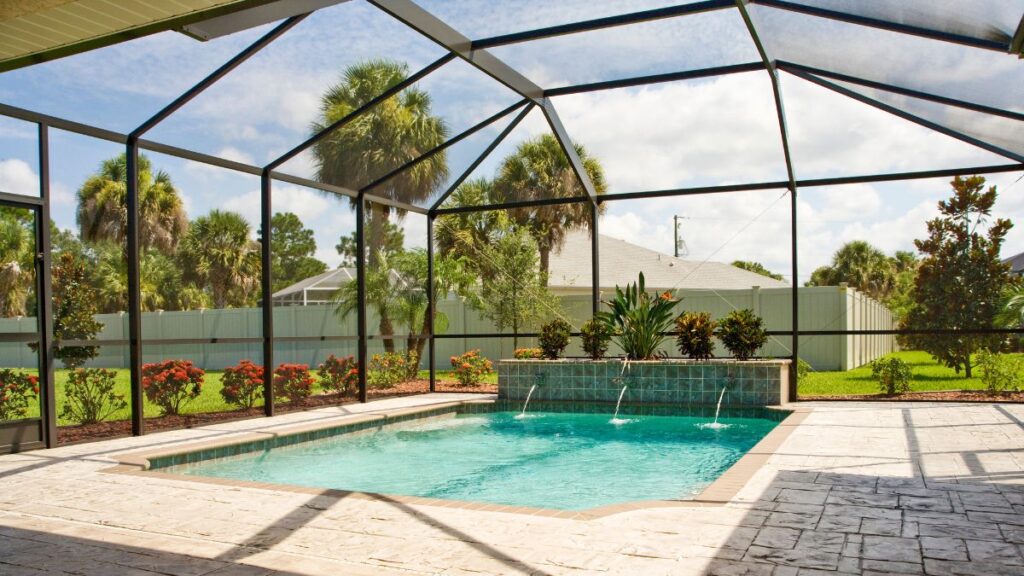
Common Misconceptions about Saltwater Pools
As with any popular trend, a few misconceptions about saltwater pools can be confused. Let’s address this head-on and set the record straight.
Saltwater Pools Are Not Chlorine-Free
One of the most common misconceptions is that saltwater pools are chlorine-free. This is not the case. Saltwater pools generate their chlorine through the process of electrolysis.
The difference lies in the chlorine being produced on-site, within the pool system, rather than being added manually. This results in a more stable and often lower level of chlorine, which is gentler on the skin and eyes and less irritating to the respiratory system.
Saltwater Does Not Cause Corrosion
Another concern often raised is that the saltwater in these pools can cause corrosion. While it’s true that salt can be corrosive, the salt concentration in a saltwater pool is relatively low – about one-tenth the salinity of ocean water.
This low concentration and proper pool maintenance and salt-resistant materials can prevent corrosion. It’s also worth noting that many components of traditional chlorine pools are susceptible to corrosion and require similar preventative measures.
Saltwater Pools Are Not as Salty as the Ocean
Let’s debunk the myth that swimming in a saltwater pool is like swimming in the ocean. The salinity of a saltwater pool is much lower than the ocean’s.
The salt concentration in a saltwater pool is closer to that of a teardrop. This means you won’t experience the same buoyancy or taste the saltiness you would in the ocean. Instead, you’ll enjoy a soft, comfortable swimming experience that’s gentle on your skin and eyes.
Making the Switch: Transitioning from a Chlorine Pool to a Saltwater Pool
Are you considering transitioning from a traditional chlorine pool to a saltwater pool? It’s a decision that comes with numerous benefits, as we’ve explored earlier. But what does the transition process involve? Let’s walk you through the steps, costs, and considerations involved in making the switch.
Steps to Convert a Chlorine Pool to a Saltwater Pool
Converting your pool to a saltwater system involves a few key steps:
- Drain the Pool: The first step is to drain your existing pool. This ensures the new saltwater system starts fresh without residual chlorine or other chemicals.
- Install a Saltwater Chlorinator: The next step is to install a saltwater chlorinator, which includes a salt cell and a control unit. This system will convert the salt in the water into chlorine.
- Add Salt: Once the chlorinator is installed, it’s time to add salt to your pool. The amount of salt needed will depend on the size of your pool.
- Test the Water: After adding salt, you should test the water to ensure the salinity is at the correct level. You should also check the pH, alkalinity, and calcium hardness levels.
Costs Associated with the Transition
The cost of converting a chlorine pool to a saltwater pool can vary, depending on the size of your pool and the type of saltwater system you choose.
The initial investment can be higher than maintaining a traditional chlorine pool, but the long-term savings in reduced maintenance and chemical costs can make it a cost-effective choice.
Considerations Before Making the Switch
Before you make the switch, consider the following:
- Maintenance: While saltwater pools require less maintenance than chlorine pools, they are not maintenance-free. You will still need to monitor and adjust the chemical levels regularly.
- Equipment Compatibility: Ensure that your pool equipment and materials are compatible with saltwater to prevent corrosion.
- Professional Installation: Consider hiring a professional to install the saltwater system. This can ensure the system is installed correctly and operates efficiently.
The Challenges of Saltwater Pools
Despite the numerous advantages of saltwater pools, they also come with their own set of challenges. From higher upfront costs to the potential erosion of pool components, here are some factors you should consider:
Substantial Initial Cost
Transitioning from a chlorine pool to a saltwater system can be quite costly. The initial investment includes purchasing a saltwater generator and the labor costs for its installation. Although you’ll save on chlorine costs in the long run, the initial conversion to a saltwater system can be a significant expense.
Complex and Costly Maintenance
Adding a new component to your pool system, like a saltwater generator, inevitably increases maintenance requirements. The salt cell within the system needs cleaning every few months and replacement every three to seven years.
An electronic system may require professional servicing for major repairs or maintenance. Furthermore, while you won’t need to purchase chlorine regularly, the saltwater generator will increase your electricity usage.
Fluctuating Chemical Levels
While not manually adding chlorine to your pool is appealing, you’ll still need to test and balance your water chemistry regularly. For instance, your pH levels may rise as your saltwater generator operates. A pH above 7.6 can cause skin irritation, burning eyes, and calcium build-up or scaling on your pool equipment.
Inefficiency in Cold Temperatures
Saltwater pool systems are ineffective at producing chlorine when the water temperature drops below 60 degrees Fahrenheit (15.5 degrees Celsius). If you live in a colder climate and don’t have a pool heater, your chlorine production will cease when the water temperature falls too low.
Potential for Corrosion
Although saltwater is generally harmless in moderate amounts, it can cause damage if it accumulates. Automatic pool covers, pool liners, metal pool equipment, and even natural stonework or landscaping near the pool can begin to erode with excessive saltwater exposure.
Pay special attention to exposed metal components, especially in vinyl pools. However, fiberglass pools are generally more resistant to saltwater corrosion.
Frequently Asked Questions about Saltwater Pools
Why Do People Prefer Saltwater Pools?
People prefer saltwater pools for a variety of reasons. The water in a saltwater pool feels softer and is gentler on the skin and eyes. Saltwater pools also require less maintenance than traditional chlorine pools and can be more cost-effective in the long run. Additionally, they don’t have the strong chlorine smell that is often associated with traditional pools.
What Are the Health Benefits of a Saltwater Pool?
Saltwater pools offer several health benefits. They are gentler on the skin and eyes, which can be especially beneficial for people with sensitive skin or allergies. The saltwater can also have a soothing effect on the skin, which can be beneficial for people with skin conditions like eczema or psoriasis. Additionally, the lower chlorine levels in saltwater pools can be less irritating to the respiratory system.
Is a Saltwater Pool Healthier?
While both saltwater and chlorine pools are safe when maintained properly, saltwater pools can be a healthier choice for some people. The lower chlorine levels and softer water can be gentler on the skin, eyes, and respiratory system.
What Are the Pros and Cons of a Saltwater Pool?
Like anything, saltwater pools have their pros and cons. On the plus side, they require less maintenance, are gentler on the skin and eyes, and don’t have a strong chlorine smell. On the downside, the initial cost of installing a saltwater system can be higher than a traditional chlorine system, and some components of the pool may need to be upgraded to be compatible with saltwater.
How Do I Treat My Saltwater Pool?
Treating a saltwater pool involves maintaining the correct salt levels and chemical levels, cleaning the salt cell as needed, and regularly testing the water to ensure it’s properly balanced.
Is a Saltwater Pool Good for Your Skin?
Yes, the saltwater in these pools can be beneficial for your skin. It’s gentler than traditional chlorine water and can help to moisturize the skin and alleviate symptoms of certain skin conditions.



